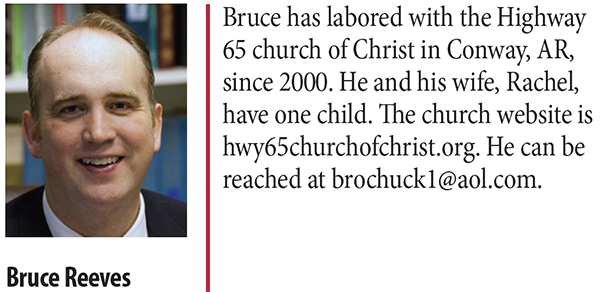by Bruce Reeves
Synopsis: The Scriptures clearly teach that serving as a deacon among God’s people is a rewarding and honorable work. Elders are uniquely positioned to help such men perform to the peak of their ability and grow in their spiritual service.
Biblical edification means much more than merely feeling good after a worship service or as a result of a sermon. The Scriptures use the term “edify” to refer to being built up in the faith (Jude 20) and equipping one another to serve God at the highest level possible. This happens through the teaching and correction of God’s word, the praise of His name in worship, and the encouragement that we receive from His promises (Acts 20:28; 2 Tim. 4:2; 1 Pet. 5:1-4). It is not about being a Christian for someone else, but encouraging one another to serve the Lord and His children. The apostle Paul writes, “He gave some as apostles, and some as prophets, and some as evangelists, and some as pastors and teachers, for the equipping of the saints for the work of service, to the building up of the body of Christ” (Eph. 4:11-12). When we ponder the overseers’s work, we must consider how they are to shepherd their brethren in Christ, including those who serve as deacons in the local congregation.
Scripture makes it clear that serving as a deacon (see note #1) is a rewarding and honorable work among God’s people. The inspired apostle emphasizes the significance and value of deacons in the very beginning of his letter to the church at Philippi: “Paul and Timothy, bond-servants of Christ Jesus, to all the saints in Christ Jesus who are in Philippi, including the overseers and deacons” (Phil. 1:1). Paul reveals the qualities that shepherds possess (1 Tim. 3:1-7; Titus 1:5-11), and also instructs Timothy regarding the character of those who serve as deacons (1 Tim. 3:8-13).
These special servants must be devoted “to the mystery of the faith with a clear conscience” (1 Tim. 3:9). They should also be men of dignity, exercising self-control, exemplify a commitment to Christ, and being godly leaders of their families (1 Tim. 3:8-10, 12). The apostle writes, “Those who have served well as deacons obtain for themselves a high standing and great confidence in the faith that is in Christ Jesus” (1 Tim. 3:13). Those who serve as deacons can be assured that their work will provide them with frequent opportunities to manifest steadfast faith and a Christ-like spirit among believers. Jesus exalts the virtue of servitude in His teaching when He says, “Whoever wishes to become great among you shall be your servant, and whoever wishes to be first among you shall be your servant” (Matt. 20:26-27; cf. Phil. 2:6-8).
We may have different roles and abilities, but the same Father, Lord, and Spirit blesses and strengthens us all (1 Cor. 12:11-27). The apostle admonishes us to support one another, “Therefore encourage one another and build up one another, just as you also are doing” (1 Thess. 5:11). Shepherds should express their appreciation to deacons in their work for the Lord and His people. They are uniquely positioned to encourage deacons in personal and powerful ways.
Too often, there is a wall between elders and deacons that should not exist. Communication, encouragement, transparency, and constructive critique are not tolerated. As a result, there is no real fellowship, relationship, or growth. Brethren, these things should not be! Shepherds can mentor deacons through meeting with one another, discussing the work of the congregation, and sharing the reasoning behind decisions when appropriate. Such joint participation can shape the thinking of deacons, inform them of complexities that may arise among brethren, and lead them to have more insight into the biblical leadership model. Sometimes elders are not at liberty to share all the details of a situation, but more often than not, there will be opportunities for mutual openness between overseers and deacons. There may even be situations in which the deacons can share concerns with the elders for the benefit of the local church.
Nevertheless, it must be recognized that there is a clear scriptural distinction between the work of elders and deacons. Elders are overseers and pastors who focus on feeding the flock with the word of God (Acts 20:28), caring for souls (Heb. 13:17), and tending to spiritual matters (1 Pet. 5:1-4). Deacons are servants of the church who assist physical needs, fulfill tasks assigned by the elders, and function in submission to the shepherds. Deacons can alleviate pressures that may distract elders from fully devoting themselves to the spiritual work of shepherding. They can express mercy to those who may be suffering (Acts 6:1-7) (see note #2). A rewarding aspect of the mentoring process is to know one another well enough to identify talents and abilities and to help one another mature in Christ. Shepherds must exercise discernment and wisdom in assigning responsibilities to men who serve as deacons to benefit God’s work and encourage those striving to serve.
There is practical wisdom in the requirement for shepherds to be men of “self-control,” “not self-willed,” and “not quick-tempered” (Titus 1:6-7). Often there are highly emotional and volatile situations that demand a calm but resolved spirit. These circumstances can occur in surprising ways. For instance, it may arise through ungodly attitudes from members in a local church toward the elders but may be expressed against a deacon who only does what he was asked to do. Differences and disagreements may occur among deacons over certain issues. We must seek to be of one mind and one spirit (Phil. 1:27-2:1-5). If there is alienation, we must be open, honest, and gracious toward each other for the sake of Christ (Gal. 6:1-2; Eph. 4:29-32). Godly attitudes must be modeled and encouraged by shepherds (Heb. 13:7). There is no room for divisiveness, slander, or gossip by those serving the Lord’s people as elders or deacons.
One of the keys by which shepherds can help congregations grow is by allowing deacons to be deacons while shepherds fulfill their own spiritual work. Elders can end up frustrating faithful deacons by micromanaging their responsibilities. While elders must faithfully oversee deacons’ work, there must also be a willingness to allow servants of the church to do what has been delegated to them. Congregations will stagnate if elders end up doing the work of deacons, deacons will be frustrated because they are not permitted to do what they should do, and preachers will be expected to perform the job that shepherds ought to be doing. The solution is for each of us to carry out the responsibilities of our given roles, and mutually support one another.
Not only should shepherds encourage growth in the entire congregation, but they should also encourage growth among the deacons. This does not mean that every deacon will eventually serve as an elder, but we must encourage and exhort deacons to reach their potential as servants of the Lord. This includes challenging and mentoring these brothers to develop and grow (Eph. 4:16; 2 Pet. 3:18). This will include prayer, Bible study, encouragement, conversations, compassion, edification, and being of the “same mind and the same judgment” (1 Cor. 1:10). May God bless us all in our fellowship to be all that we can be through His amazing grace and powerful word!
#1: In Scripture, the term diakonos simply means “servant.” Sometimes it is used in a generic sense of believers and gospel preachers. However, it is also used in a technical sense of men who are appointed by a local congregation to serve God’s people (Phil. 1:1; 1 Tim. 3:8-13).
#2: Although there may be some distinctions in the specially appointed servants in Acts 6:1-7 and the deacons mentioned in 1 Timothy 3:8-13, it must be acknowledged that we have an example of the congregation appointing godly men to serve particular needs to enable the leaders to focus on spiritual matters. Because two things are not identical does not deny that there are parallels.


